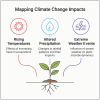Plant Microbiomes Alleviate Abiotic Stress-Associated Damage in Crops and Enhance Climate-Resilient Agriculture
- PMID: 40573878
- PMCID: PMC12196735
- DOI: 10.3390/plants14121890
Plant Microbiomes Alleviate Abiotic Stress-Associated Damage in Crops and Enhance Climate-Resilient Agriculture
Abstract
Plant microbiomes, composed of a diverse array of microorganisms such as bacteria, fungi, archaea, and microalgae, are critical to plant health and resilience, playing key roles in nutrient cycling, stress mitigation, and disease resistance. Climate change is expected to intensify various abiotic stressors, such as drought, salinity, temperature extremes, nutrient deficiencies, and heavy metal toxicity. Plant-associated microbiomes have emerged as a promising natural solution to help mitigate these stresses and enhance agricultural resilience. However, translating laboratory findings into real-world agricultural benefits remains a significant challenge due to the complexity of plant-microbe interactions under field conditions. We explore the roles of plant microbiomes in combating abiotic stress and discuss advances in microbiome engineering strategies, including synthetic biology, microbial consortia design, metagenomics, and CRISPR-Cas, with a focus on enhancing their practical application in agriculture. Integrating microbiome-based solutions into climate-smart agricultural practices may contribute to long-term sustainability. Finally, we underscore the importance of interdisciplinary collaboration in overcoming existing challenges. Microbiome-based solutions hold promise for improving global food security and promoting sustainable agricultural practices in the face of climate change.
Keywords: abiotic stress; climate change; crop plants; metagenomics; microbial consortia; plant microbiomes; stress resilience; sustainable agriculture; synthetic biology.
Conflict of interest statement
The authors declare no conflicts of interest.
Figures





Similar articles
-
Advancements in Water-Saving Strategies and Crop Adaptation to Drought: A Comprehensive Review.Physiol Plant. 2025 Jul-Aug;177(4):e70332. doi: 10.1111/ppl.70332. Physiol Plant. 2025. PMID: 40599019 Free PMC article. Review.
-
Abiotic stress responses in forage crops and grasses: the role of secondary metabolites and biotechnological interventions.Front Plant Sci. 2025 Jun 3;16:1542519. doi: 10.3389/fpls.2025.1542519. eCollection 2025. Front Plant Sci. 2025. PMID: 40567415 Free PMC article. Review.
-
Harnessing halophyte-derived allelochemicals and signaling molecules to enhance salinity tolerance in crops.Am J Bot. 2025 Aug;112(8):e70076. doi: 10.1002/ajb2.70076. Epub 2025 Jul 21. Am J Bot. 2025. PMID: 40692138 Free PMC article. Review.
-
Evolution of agricultural biotechnology is the paradigm shift in crop resilience and development: a review.Front Plant Sci. 2025 Jun 19;16:1585826. doi: 10.3389/fpls.2025.1585826. eCollection 2025. Front Plant Sci. 2025. PMID: 40612601 Free PMC article. Review.
-
Unlocking Plant Resilience: Metabolomic Insights into Abiotic Stress Tolerance in Crops.Metabolites. 2025 Jun 9;15(6):384. doi: 10.3390/metabo15060384. Metabolites. 2025. PMID: 40559408 Free PMC article. Review.
References
-
- Albahri G., Alyamani A.A., Badran A., Hijazi A., Nasser M., Maresca M., Baydoun E. Enhancing essential grains yield for sustainable food security and bio-safe agriculture through latest innovative approaches. Agronomy. 2023;13:1709. doi: 10.3390/agronomy13071709. - DOI
-
- Lam D. The Next 2 Billion: Can the World Support 10 Billion People? Popul. Dev. Rev. 2025;51:63–102. doi: 10.1111/padr.12685. - DOI
-
- Hossain M.E., Shahrukh S., Hossain S.A. Environmental Degradation: Challenges and Strategies for Mitigation. Springer; Berlin/Heidelberg, Germany: 2022. Chemical fertilizers and pesticides: Impacts on soil degradation, groundwater, and human health in Bangladesh; pp. 63–92.
Publication types
LinkOut - more resources
Full Text Sources

